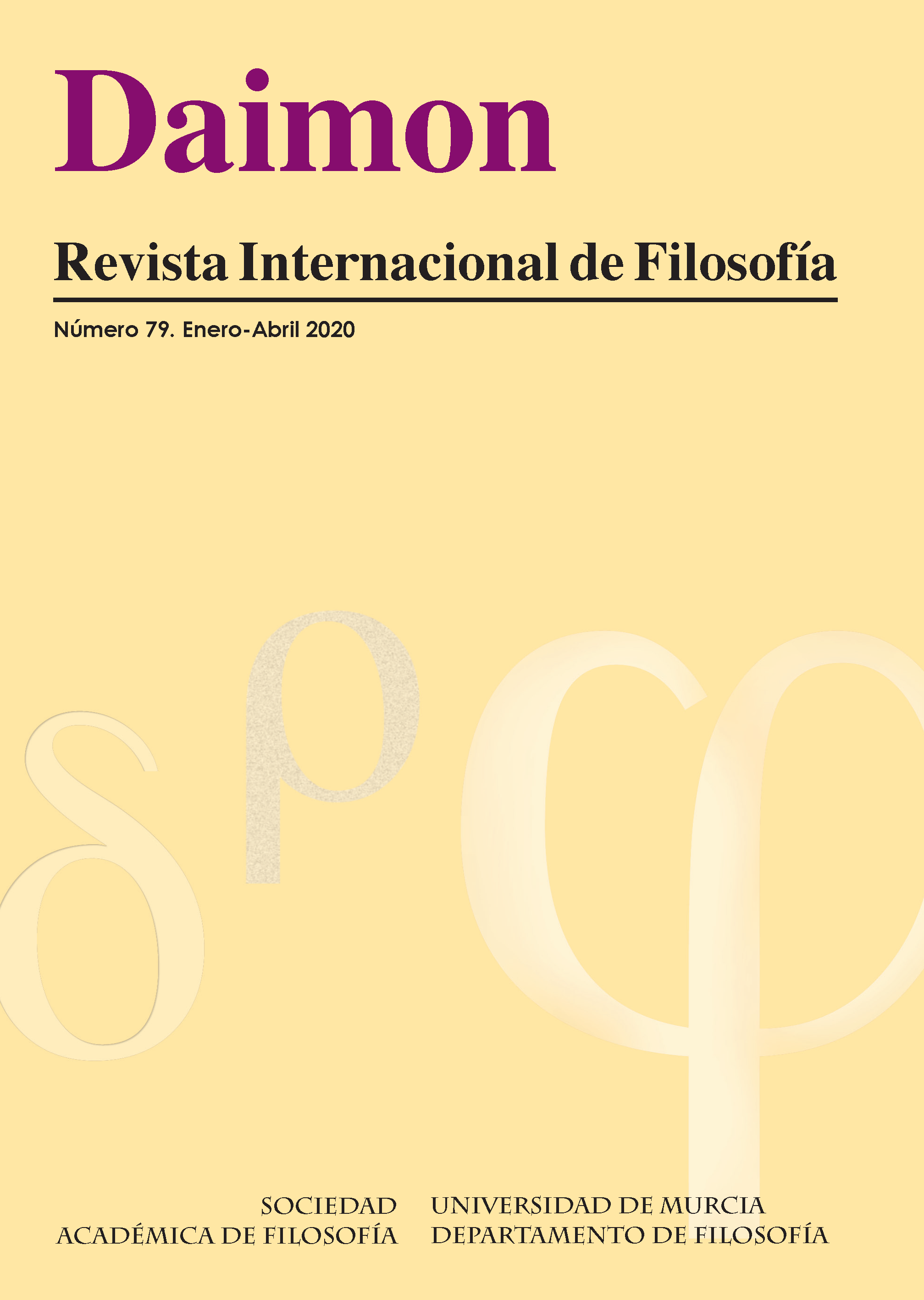Metamorfosis y preformación en G.W. Leibniz
Abstract
Este trabajo analiza la complicidad entre las ideas de metamorfosis, preformación y armonía en el pensamiento de Leibniz. El preformacionismo le permite desarrollar su teoría de la armonía preestablecida en el plano de la filosofía natural. Además, las explicaciones ontogenéticas con base en la idea de metamorfosis le sitúan en la antesala de las teorías de la evolución. Esto se observa en el modo como explica la relación entre el viviente y su entorno, en la sustitución del hilemorfismo por la idea de desarrollo y en incluir la dimensión histórica en el estudio de la diversidad de las especies.
Downloads
-
Abstract480
-
PDF (Español (España))425
Literaturhinweise
Arthur, R. (2006), «Animal Generation and Substance in Sennert and Leibniz», en: Justin E. H. Smith, ed., The Problem of Animal Generation in Early Modern Philosophy, Cambridge: Cambridge University Press, pp. 147-174.
Aristóteles [PA] (2000), Partes de los animales. Marcha de los animales. Movimiento de los animales, Ed. y Trad. E. Jiménez y A. Alonso, Madrid: Gredos.
Becchi, A. (2016), «Leibniz’ Harlequin and the Theater of Organic Bodies», en: Wenchao Li, ed., Für unser Glück oder das Glück anderer, Hildesheim: Georg Olms Verlag, Band II, pp. 401-417.
Brandt Bolton, M. (2016), «The Continuity of Species, Concepts of Species Determined by Nature, and Concepts with Indeterminate Boundaries in Nouveaux Essais», en: Wenchao Li, ed., Für unser Glück oder das Glück anderer, Hildesheim: Georg Olms Verlag, Band V, pp. 89-103.
Cardoso, A. (2014), «El laberinto de la continuidad entre lo físico y lo moral en Leibniz», Ponencia en el II Congreso Iberoamericano Leibniz, Granada, 3-5 abril.
Deleuze, G. (1989), El pliegue. Leibniz y el Barroco, Barcelona: Paidos.
Duchesneau, F. (1998), Les modèles du vivant de Descartes à Leibniz, Paris: Vrin.
Duchesneau, F. (2003), «Leibniz's Model for Analyzing Organic Phenomena», Perspectives on Science, 11/4, Winter, pp. 378-409.
Duchesneau, F. (2010), Leibniz le vivant et l'organisme, Paris: Vrin.
Laerke, M. (2001), «Deleuzian Becomings and Leibnizian Transubstantiation», Pli, 12, pp. 104-117.
Leibniz, G.W. [AA] (1923- ), Sämtliche Schriften und Briefe, Ed. Deutsche Akademie der Wissenschaften, Darmstadt/Leipzig/Berlin: Akademie Verlag.
Leibniz, G.W. [GM] (1962), Die matematische Schriften, 7 vols., Ed. C.I. Gerhardt, Berlin: A. Asher; Halle: H.W. Schmidt.
Leibniz, G.W. [Couturat]. 1966. Opuscules et fragments inédits (extraits des manuscrits de la Bibliothèque Royale de Hanovre). Ed. L. Couturat. Hildesheim: Georg Olms Verlag.
Leibniz, G.W. [GP] (1978), Die philosophische Schriften von Gottfried Wilhelm Leibniz, 7 vols., Ed. C.I. Gerhardt, Hildesheim: Georg Olms Verlag.
Leibniz, G.W. [Dutens] (1989), G. G. Leibnitii Opera Omnia, 6 vols., Ed. L. Dutens, Hildesheim: Georg Olms Verlag.
Leibniz, G.W. [Echeverría] (1992), G.W. Leibniz. Nuevos ensayos sobre el entendimiento humano, Ed. y Trad. Javier Echeverría, Madrid: Alianza Editorial.
Leibniz, G.W. [Finster] (1997), G.W. Leibniz, Der Briefwechsel mit Antoine Arnauld, Ed. R. Finster, Hamburg.
Leibniz, G.W. [OFC] (2007- ), G.W. Leibniz. Obras filosóficas y científicas, Granada: Comares.
Newmann, W. R. & Principe, L. M. (2002), Alchemy tried in the fire: Starkey, Boyle, and the fate of Helmontian chymistry, Chicago: University of Chicago Press.
Ogilvie, B. W. (2014), «Order of Insects. Insect Species And Metamorphosis between Renaissance and Enlightenment», en: J.E.H. Smith & O. Nachtomy (eds.), The Life Science in Early Modern Philosophy, New York: Oxford University Press, pp. 222-245.
Orio de Miguel, B. (1993), Leibniz y la tradición teosófico-kabbalística, 2 vols., Madrid: Ed. Universidad Complutense.
Orio de Miguel, B. (2002), Leibniz y el pensamiento hermético, 2 vols., Valencia: Universidad Politécnica de Valencia.
Pasini, E. (1992), Corpo e funzioni cognitive in Leibniz, Milano: FrancoAngeli.
Pyle, A. (1987), «Animal Generation and the Mechanical Philosophy: Some Light on the Role of Biology in the Scientific Revolution», History and Philosophy of the Life Science, 9, pp. 225-254.
Pyle, A. (2006), «Malebranche on Animal Generation. Preexistence and the Microscope», en: J. E.H. Smith (ed.), The Problem of Animal Generation in Early Modern Philosophy, Cambridge: Cambridge University Press, pp. 194-214.
Schweitz, L.F. (2014), «On the Continuity of Nature and the Uniqueness of Human Life in G.W. Leibniz», en: J.E.H. Smith & O. Nachtomy (eds.), The Life Science in Early Modern Philosophy, New York: Oxford University Press, pp. 205-222.
Smith, J.E.H. (2006), «Imagination and the Problem of Heredity in Mechanist Embryology», en: J.E.H. Smith (ed.), The Problem of Animal Generation in Early Modern Philosophy, Cambridge: Cambridge University Press, pp. 80-103.
Smith, J.E.H. (2011), Divine machines: Leibniz and the sciences of life, New Jersey: Princeton University Press.
Smith, J.E.H. (2012), «Spirit is a stomach: the iatrochemical roots of Leibniz theory of corporeal substance», en: G. Manning (ed.), Matter and Form in Early Modern Science and Philosophy, Leiden: Brill, pp. 203-224.
Wiener, P.P. (1940), «Leibniz's Project of a Public Exhibition of Scientific Inventions», Journal of the History of Ideas, 1/2, Apr., pp. 232-240.
Las obras que se publican en esta revista están sujetas a los siguientes términos:
1. El Servicio de Publicaciones de la Universidad de Murcia (la editorial) conserva los derechos patrimoniales (copyright) de las obras publicadas, y favorece y permite la reutilización de las mismas bajo la licencia de uso indicada en el punto 2.
2. Las obras se publican en la edición electrónica de la revista bajo una licencia Creative Commons Reconocimiento-NoComercial-SinObraDerivada 3.0 España (texto legal). Se pueden copiar, usar, difundir, transmitir y exponer públicamente, siempre que: i) se cite la autoría y la fuente original de su publicación (revista, editorial y URL de la obra); ii) no se usen para fines comerciales; iii) si remezcla, transforma o crea a partir del material, no podrá distribuir el material modificado.
3. Condiciones de auto-archivo. Se permite y se anima a los autores a difundir electrónicamente las versiones pre-print (versión antes de ser evaluada) y/o post-print (versión evaluada y aceptada para su publicación) de sus obras antes de su publicación, ya que favorece su circulación y difusión más temprana y con ello un posible aumento en su citación y alcance entre la comunidad académica. Color RoMEO: verde.











